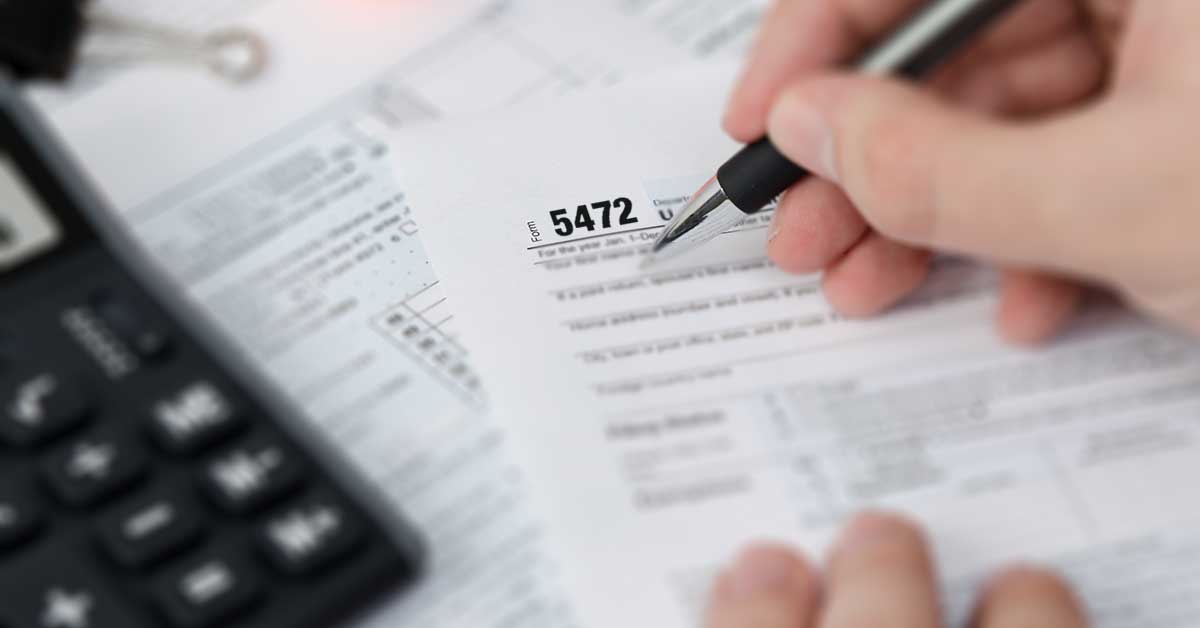IRS Form 5472 is known as Information Return of a 25% Foreign Owned US Corporation or a Foreign Corporation Engaged in a US Trade or Business. As the name of the form suggests, it is for US businesses which have at least 25% of foreign ownership and are involved in a US business or trade.
Form 5472 gives these businesses a way to disclose all “reportable transactions” to the IRS.
Around the end of 2016, the IRS came up with some crucial changes in Form 5472. It included foreign owned US disregarded entities under its purview as well. It effectively meant that US disregarded entities would be considered as domestic US corporations.
So, to make it clear, Form 5472 demands information from not only US corporations about foreign involvement in its business, but also foreign persons who have substantial interests in US businesses.
The widened scope of Form 5472 has made even non-US persons file IRS forms which are normally meant for US persons. Foreign or domestic, interest in US business is to be disclosed via Form 5472.
The motivation behind the changes to Form 5472
 There were plenty of reasons why foreign nationals owned a US LLC. For some, it was a part of their tax planning, while for some others, it was a way to collect US dollars from American customers of their businesses.
There were plenty of reasons why foreign nationals owned a US LLC. For some, it was a part of their tax planning, while for some others, it was a way to collect US dollars from American customers of their businesses.
The interesting thing with US LLCs is that certain states allow US and non-US persons to own and operate an LLC completely anonymously. States like Delaware, New Mexico, and Wyoming offer great privacy to owners of LLCs.
This anonymity led to certain foreign nationals stretching the laws for activities that the IRS and the US government considered questionable. For example, foreign LLC owners started purchasing property in places like New York City.
The properties got registered under the LLCs name and no one would know who owned these properties.
The US government wanted to put an end to this trend and wanted to know exactly how money was coming into the country.
There were fears of large scale income tax evasion being carried out via the LLC route. Hence, the changes in the scope of Form 5472 became a reality.
The extensive requirements of Form 5472
 Form 5472 now asks foreign filers who own a US disregarded entity to provide a foreign taxpayer identification number (FTIN). Obtaining this taxpayer number is not a simple process.
Form 5472 now asks foreign filers who own a US disregarded entity to provide a foreign taxpayer identification number (FTIN). Obtaining this taxpayer number is not a simple process.
It can take months and involves a lot of time-consuming paperwork. Most importantly, this number has to be in place before the foreign national can file his/her returns.
The list of qualifying transactions that need to be reported on Form 5472 is two pages long.
It includes rent payments, sales proceeds, royalties, interest income, commissions, insurance premiums, loans between the LLC/corporation and foreign shareholders, equity related payments from the formation, dissolution, acquisition, or disposition of an entity, and much more. Basically, any cash that is either coming into the corporation or going out of it are covered under Form 5472’s requirements.
What exactly is considered a disregarded entity?
A disregarded entity is one that the IRS disregards an en entity that is separate from its owner for tax purposes.
This definition generally applies to US LLCs. US LLCs are tax transparent and all its profits flow straight to the shareholders. A US person owning a disregarded entity does not have to file Form 5472.
However, if the entity is 25% or more foreign owned then both the US and foreign owners of that entity have to file Form 5472.
An informational return
 It is important to note that Form 5472 is not a tax return. It is simply a way for filers to disclose to the IRS the various types of transactions that their corporations have made throughout the year.
It is important to note that Form 5472 is not a tax return. It is simply a way for filers to disclose to the IRS the various types of transactions that their corporations have made throughout the year.
These transactions also include transactions made with foreign parties.
For foreign individuals who own a substantial part of an LLC or have an LLC of their own, the Form 5472 is a way for them to disclose their business interest in the US.
The IRS wants to know who is doing business in the US and Form 5472 allows it to identify those entities that are trading or doing business in the country. Foreign nationals do not have to file Form 5472 because it will make them pay their taxes. Rather, it is an informational return which will disclose certain details to the IRS.
Who files Form 5472?
Any foreign individual who directly or indirectly owns 25% or more in a US company has to file Form 5472.
If multiple foreign nationals hold 25% each, then each of those individuals has to file a separate Form 5472. If multiple foreign nationals hold an aggregate of 25% or more in a US company but individually own less than 25%, then those individuals do not need to file Form 5472.
If you are a foreign individual who has set up a US LLC through services like Stripe Atlas, then you need to file Form 5472. Foreign individuals have to disclose their name, address, country of citizenship, organization information, and all qualifying transactions made by the individual.
Any foreign company that does business in the US and derives income from any economic activity in the US also needs to file Form 5472. If a US citizen operates a foreign company abroad, and if that company owns a US disregarded entity, then that US citizen also has to file Form 5472.
Even non-US citizens who own a foreign company that, in turn, owns a US disregarded entity, then such non-US citizens also have to file Form 5472.
When should you file Form 5472?
Form 5472 is normally filed along with the US corporation’s annual tax return. Any extensions availed by the US corporation also apply to deadlines for Form 5472.
For a foreign national, the IRS considers the tax year as the calendar year. So, if the foreign national has no US tax return to file, then he/she will have to file Form 5472 in early January for the year gone by.
Are there penalties for not filing Form 5472?
 The standard penalty for not filing Form 5472 or filing an incomplete Form 5472 is $10,000 per year. Other collateral damage would be increased vigilance of the company by the IRS and multiple follow-ups and audits in subsequent years.
The standard penalty for not filing Form 5472 or filing an incomplete Form 5472 is $10,000 per year. Other collateral damage would be increased vigilance of the company by the IRS and multiple follow-ups and audits in subsequent years.
Even though Form 5472 states the penalty for non-compliance to be $10,000, the penalties can actually be a lot higher. Recent changes in the Tax Cuts and Jobs Act hiked the penalties required under Sections 6038a (d)(1) to $25,000.
These changes also extend to any reportable transactions occurring under Section 6038b. That section is the basis for all the filing requirements of Form 5472. It is always recommended that you file Form 5472 if you think you are required to.
Countries around the world are increasingly getting serious about tax returns and informational returns. Provisions like FATCA make it very difficult to hide any transaction or ownership of assets. It is a good idea to work with a tax professional and understand whether the Form 5472 requirements apply to you.
The US, with its network and reach, will find out one way or another, if there is any non-compliance. The penalties for non-compliance are quite steep as well.
